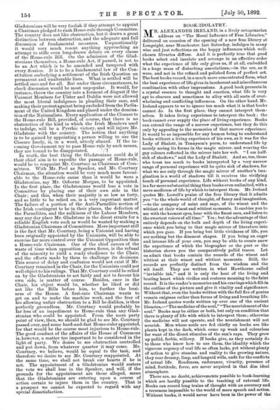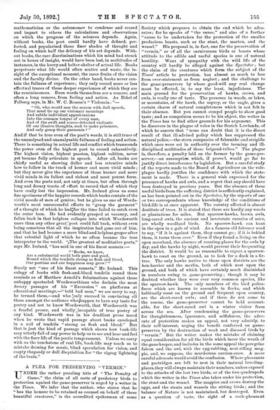BOOK-IDOLATRY.
MR. ALEXANDER IRELAND, in a lively octogenarian address on "The Moral Influence of Free Libraries," delivered on occasion of the opening of a new free library at
Longsight, near Manchester, last Saturday, indulges in many wise and just reflections on the happy influences which well- chosen libraries diffuse. And it is perfectly true that good books select and insulate and arrange in an effective order what the experience of life only gives us, if at all, embedded in a huge mass of disturbing associations,—in the ore, as it were, and not in the refined and polished form of perfect art. The best books record, in a much more concentrated form, what the best experience of life gives in incoherent and miscellaneous combination with other impressions. A good book presents in a crystal essence to thought and emotion, what life is very apt to obscure and sometimes to alloy with all sorts of over- whelming and conflicting influences. On the other hand, Mr. Ireland appears to us to ignore too much what it is that books cannot do. In the first place, they cannot interpret them- selves. It takes living experience to interpret the book ; the book cannot ever supply the place of living experience. Books can extend the range of a narrow experience, but they do this only by appealing to the memories of that narrow experience. It would be as impossible for any human being to understand books without a living experience of his own, as it was for the Lady of Shalott, in Tennyson's poem, to understand life by merely seeing its forms in the magic mirror, and weaving the gay colours reflected in the mirror into her web. "I am half- sick of shadows," said the Lady of Shalott. And so, too, those who trust too much to books interpreted by a very narrow range of personal experience will be quite sick of shadows, for what we see only through the magic mirror of another's ima- gination is a world of shadows till it receives the vivifying touch of personal experience. Life without books of any kind, is a far more substantial thing than books even unlimited, with a mere modicum of life by which to interpret them. Mr. Ireland quotes Mr. Lowell's praise of the free library that it admits you "to the whole world of thought, of fancy and imagination, —to the company of saint and sage, of the wisest and the wittiest at their wisest and wittiest moments. It enables you to see with the keenest eyes, hear with the finest ears, and listen to the sweetest voices of all time." Yes ; but the advantage of that entirely depends on the bulk and depth of the living experi- ence which you bring to that magic mirror of literature into which you gaze. If you bring but little vividness of life, you see nothing but the dimmest shapes. If you bring an eager and intense life of your own, you may be able to create anew the experience of which the biographer or the poet or the historian shows you the comparatively pallid traces. Let us admit that books contain the records of the wisest and wittiest at their wisest and wittiest moments. Still, the records are perfectly distinct from the wisdom and the wit itself. They are written in what Hawthorne called "invisible ink," and it is only the heat of the living and beating heart which vivifies and restores meaning to the faint record. It is the reader's memories and his cravings which fill-in the outline of the picture and give it vitality and significance. Without that, even the books written with the full fire of genius remain enigmas rather than forms of living and breathing life. Mr. Ireland quotes words written up over one of the ancient libraries,—" The medicine of the soul," "The nourishment of the soul." Books may be either or both, but only on condition that there is plenty of life with which to interpret them ; otherwise the medicine will not operate, and the nourishment will not nourish. Men whose souls are fed chiefly on books are like plants kept in the dark, which come up weak and colourless for want of the direct stimulus of the sun's rays. They grow up pallid, feeble, willowy. If books give, as they certainly do to those who know how to use them, the ideality which the vigorous urgency of real life so often lacks, yet without plenty of action to give stamina and reality to the growing nature, they rear dreamy, limp, and languid wills, unfit for the conflicts of actual life. Readiness, endurance, vivacity, presence of mind, fortitude, force, are never acquired in that dim ideal atmosphere.
There are, no doubt, achievements possible to book-learning which are hardly possible to the teaching of external life. Books can record long trains of thought with an accuracy and a terseness impossible to the world of mere speech and action. Without books, it would never have been in the power of the mathematician or the astronomer to condense and record and impart to others the calculations and observations on which the progress of the sciences depends. Again, without books, the poet could hardly have defined, per- fected, and popularised those finer shades of thought and feeling on which half the delicacy of his art depends. With- out books, the rare discriminations which his mind had struck out in hours of insight, would have been lost, in multitudes of instances, in the hurry and helter-skelter of actual life. Books perpetuate what life would often scatter and waste, the in- sight of the exceptional moment, the rarer fruits of the vision and the faculty divine. On the other hand, books never con- tain the fullness of experience ; they only record more or less effectual traces of those deeper experiences of which they are the reminiscences. Even words themselves are a remove, and often a long remove, from feeling and action. As Ethel of Felborg says, in Mr. W. C. Roscoe's " Violenzia : "—
" Oh, who would mar the season with dull speech,
That must tie up our visionary meanings And subtle individual apprehensions Into the common tongue of every man, And of the swift and scarce-detected visitants Of our illusive thoughts, seek to make prisoners,
And only grasp their garments P"
And if that be true even of the poet's words, it is still truer of the unanalysed and unanalysable fullness of feeling and action. There is something in actual life and conflict which transcends the power even of the highest poet to record exhaustively. The highest vision, highest passion, highest volition, never yet became fully articulate in speech. After all, books are chiefly useful as showing duller and less retentive minds how to follow in the track of keener and more vivid minds ; but they never give the experience of those keener and more vivid minds in its fullest and richest and most potent form.
And even the poets nod, not only at times, but often through long and dreary tracts of effort to record that of which they have really lost the impression. Mr. Ireland gives us some fine specimens of the happier records which books contain of the vivid moods of men of genius ; but he gives us one of Words- worth's most unsuccessful efforts to "grasp the garment" of a thought of which he had:for the time failed to catch even the outer hem. He had evidently grasped at vacancy, and fallen back in that helpless collapse into which Wordsworth more than any other great:poet could fall back, without even being conscious that all the inspiration had gone out of him, and that he had become a mere blind and helpless groper after that celestial light of which he so often became the true interpreter to the world. ",The greatest of meditative poets," says Mr. Ireland, "has said in one of his finest sonnets :—
" Books, we know,
Are a substantial world both pure and good, Round which the tendrils strong as flesh and blood, Our pastime and our happiness may grow.'"
Surely not "one of his finest sonnets," Mr. Ireland. This eulogy of books with flesh-and-blood tendrils round them
reminds us of Matthew Arnold's fulminations against those unhappy spectacled Wordsworthians who declaim the most dreary passages of his " Excursion " on platforms at educational meetings,—" bold bad men," we are sorry to say, he termed them,—and who [only succeed in convincing all those amongst the audience who [happen to have any taste for poetry and not to know Wordsworth, that Wordsworth was a fearful proser, and wholly incapable of true poetry of any kind. Wordsworth was in his deadliest prose mood when he wrote that vapid passage about books enveloped in a coil of tendrils "strong as flesh and blood." But that is just the kind of passage which shows how book-life may utterly fail of any power to help us to see and hear and feel with the finer life of the poetic temperament. Unless we carry with us the touchstone of real life, book-life may teach us to mistake droning for music, blind speculation for vision, and empty rhapsody or dull disquisition for "the zigzag lightning of the brain."



































 Previous page
Previous page